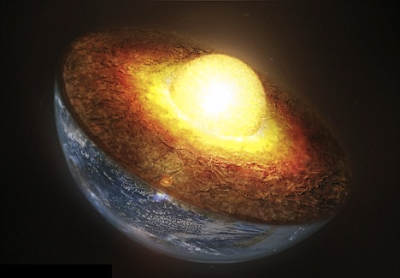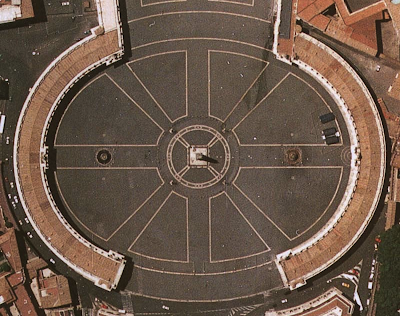Earth's Enigmatic CoreScientists freely admit that 'We know more about distant galaxies than we do about the interior of our own planet.' Of particular interest is the region between the outer mantle and the inner solid core which exists in a hard-to-define 'liquid' state. This liquid 'outer core' is apparently well mixed and perplexingly not stratified or layered in any discernable fashion ... |
The Earth & Moon Ring Like Mighty BellsAfter large earthquakes (magnitude of 8 and greater on the Richter scale) the Earth sets to regular, rhythmic oscillations, not unlike the ringing of a bell after it has been hit with a hammer. The Sumatra earthquake in 2004, for instance, left the earth ringing for several months afterwards. The moon also freely oscillates when struck with a sufficiently large "hammer" ... |
Third Reich Maps of the Inner EarthWe've all heard tales of Nazis exploring the southern extremities of the globe and even setting up bases in Neuschwabenland. Some have also heard of Operation Highjump and Admiral Byrd's altercation with entranched German forces that overpowered them with amazing flying craft. A video has recently surfaced which shows a 1944 map from the Third Reich detailing not only ... |
Missing Matter, Dyson Spheres & Hollow EarthModern physics sheepishly concedes that 83% of the matter of the visible universe appears to be missing. What you say? Well, scientists assume that celestial bodies are solid and composed of a certain portion of matter according to our accepted notions of gravity. They observe the interractions of these bodies and attribute a certain interrelationship of matter to ... |
Our Magnificent Inner SunVideo game designer, Nick Marks, suggested that there are the larger suns that generally form at the center of solar systems but then you have much smaller suns around which dyson sphere type planetary crusts can form. He also suggested that perhaps there were anomalies such as coronal mass ejections on the surface of these suns which spewed out material that ... |
Rogue Planets, Nibiru & Hollow WorldsZecharia Sitchin has become famous for his book "12th Planet" in which he wrote about a rogue member of the solar system that orbits the sun once every 3600 years. He was able to decipher this information from ancient Sumerian cuneiform tablets which describe the god-like inhabitants of this mysterious satellite. These Annunaki, as they are called, set up an outpost ... |
The Tibetan World of Agharta"The word 'Agharta' is of Buddhist origin. It refers to the subterranean world or empire in whose existence all true Buddhists fervently believe. They also believe that this Subterranean World has millions of inhabitants and many cities, all under the supreme domination of the subterranean world capital, Shamballah, where dwells the supreme ruler of this empire, known in the ... |
The Sun — A Living Star?If the hollow earth is being kept a secret from us, just what other anomolies and truths are being held back. We speak a lot about the inner earth and how planets with intense surface conditions, may actually foster favorable conditions for sustaining life on the inner surface. The sun as we know it, is not a flaming ball of hydrogen, but, rather a solid, hollow shell. This shell ... |
The Rays of ShamashThe Assyro-Babylonian sun god, Shamash (or Utu in ancient Summeria), was often depicted by a 4-pointed star-like symbol with wavy lines emanating from between four protruding lobes. 'Floating' in the free space of the middle of the symbol is a heavy dot or circle separate from the rest of the icon. All this was typically circumscribed by a thick outer circle. Although there is ... |
The Solar WheelThe solar wheel is a motif that repeats itself throughout all cultures from as far back as history can be traced. It first made its mark during the neolithic periods but since then has evolved into many forms. It appears as the point in the circle or monad and evolved to its more sophisticated forms as currently used in Christian architecture and priestly garb today ... |
The Vatican — A Bird's Eye PerspectiveThen you have the largest solar cross of them all ... at the Vatican — St. Peter's Square next to the Basilica, Rome. Before we dive into a discussion of St. Peter's Square, let's first acknowledge that the Vatican is in possession of one of the oldest libraries in the world with some of the most significant historical texts — over 75,000 manuscripts and 1.1 million printed books ... |
The SwastikaAh the swastika, perhaps the most misunderstood icon of all time. The word swastika comes from the Sanskrit words 'su', meaning 'well', and 'asti', meaning 'to be'. The swastika has not always been used as a symbol of Nazism and was in fact borrowed from Eastern cultures. It seems to have first been used by early inhabitants of Eurasia who revered it as a symbol of ... |
<< Older Newer >>












